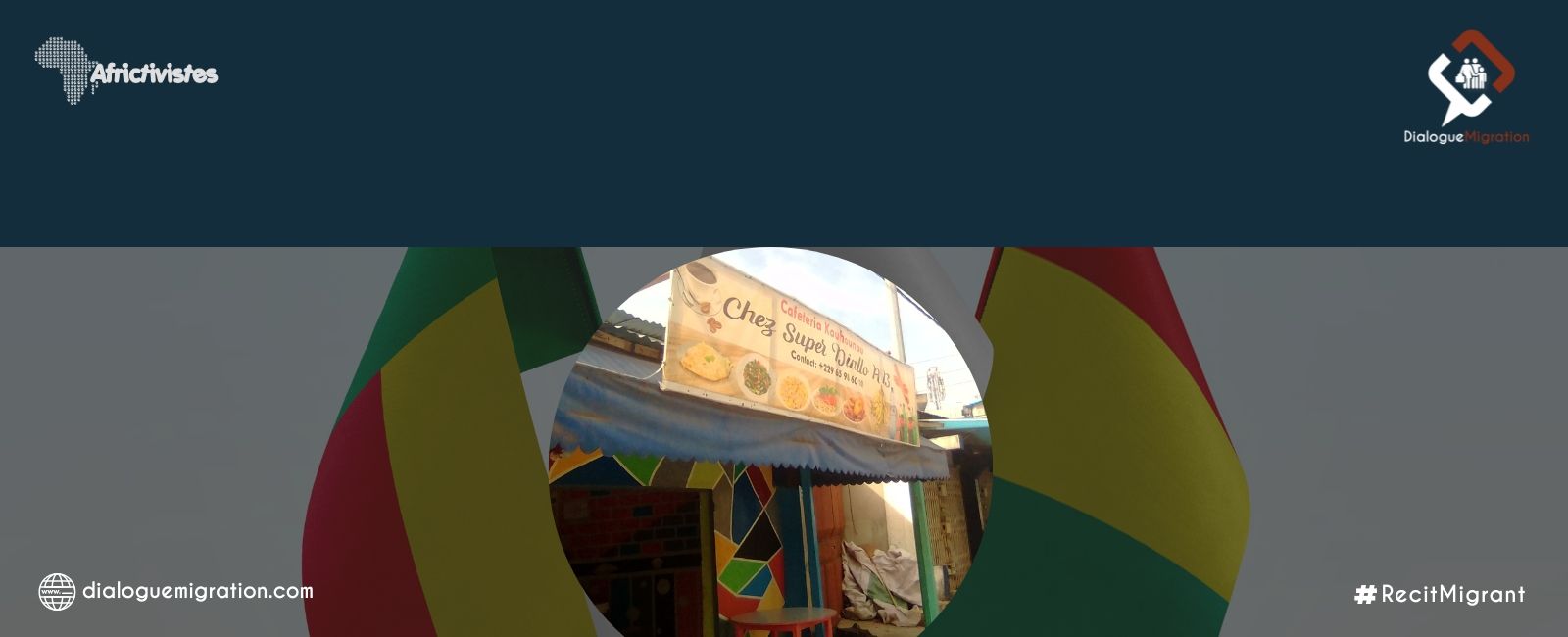

They are famous in Cotonou and surroundings. These are the cafeterias called “Chez Diallo”. Mostly run by Guineans, some of whom own them, these popular fast-food restaurants in and around Cotonou are important in this community.
In Cadjèhoun, a district located in the heart of Cotonou, this morning of March 2023, customers are placing their orders while sitting on stools all around the cafeteria. Located on a street corner overlooking the main artery where cars, motorcycles and pedestrians pass, it offers a view of the urban movement of Cotonou. A television which attracts the attention of many customers broadcasts programmes from a news channel. Abdoul, the main waiter, has no respite from the rhythm of the orders that follow one another. This is a usual fact in this place, like many others of his kind, renowned for their performances.
Daouda, the main cook and the oldest, has more than two decades of craft. He barely finishes his evening shift and the time to talk with colleagues and go home, he discusses with us. “We operate non-stop, 24 hours a day. Some have everything at home, but because of the atmosphere, they pass here. When they come, they are satisfied. We don’t neglect customers ,” he says.
The service staff is of several origins. “Here we are mixed; there are Guineans, Burkinabés, Nigeriens, Malians and Ghanaians. You don’t have to be Guinean to work with us. If you are able to do something, if there is room we hire you and you work,” he develops.
The man who has achieved almost everything in this sector admits: “All I have been able to achieve is in this activity. I have been practicing it for a long time. I grew up in it I would say! It is thanks to this job that I got married and had children, achieved a lot, etc. I have already spent nearly 25 years in Benin in the sector,” he says.
From the name ”Chez Diallo”
The inscription on most of the signs of the cafeterias “Chez Diallo”, sometimes accompanied by a substitute like “Chez Super Diallo A B” in Kouhounou, is explained by logic of identity. “Here, when customers come, they all call us “Diallo“. This is because most Guineans bear the surname Diallo. So when we say Diallo at the same time we know that it is the Guineans,” Daouda explains. Although the owner of the premises that also owns other such cafeterias in Porto-Novo, according to his employees, registered his establishment under the name “Ets Aladji Fouta-Djalon“. The owner of the cafeteria “Chez Super Diallo A B”, he also owns other cafeterias in the city.
Many of these cafeterias, once built of makeshift material, have undergone a transformation following the urban development of the Cotonou initiated in 2016. Previously, the one where Daouda works extended to the edge of the pedestrian crossing on the sidewalk. “It is with the eviction of the occupants of the public domain, that we demolished and rebuilt the cafeteria, otherwise it was made of wood,” he says. The fence of the terraced house was broken and the cafeteria built of hard materials with a more attractive décor.
Today, other communities such as Nigeriens and Senegalese are involved in the sector. Not to mention the Beninese who are also beginning to take an interest, especially the Adja community in the south-west of the country, through cafeterias called “Chez Dadjè”, the identity name of their community. Serges Folly is one of these Beninese.
Profiles of the employees of the cafeterias ”Chez Diallo”…
Contrary to the tendency to believe that workers in the cafeterias “Chez Diallo” are recruited from the country of origin by a boss, each is recruited by a competition of circumstances. “When on an adventure, you are always on the lookout for yourself”, says Daouda. Employees are not bound by a contract or relationship, as many people think. “It’s not on a contract that I came here. It was in Cotonou that we met, not from my country“, he says.
Arrived in Benin about 8 months ago from Guinea Conakry, Mohamed, 18 years old has dreams. In particular, he plans to migrate to Algeria or Morocco. To be able to continue his journey, he works to save money. Although his project is precise and clear in his head, he does not yet have a definite term. The search for funds for the trip may take more or less time than expected. “If after a year or two I haven’t been able to raise enough money, I can’t go back. You have to save a little before you leave,” says one of his co-workers.
Ibrahim works in a cafeteria in Zogbo. He spent a year in Côte d’Ivoire, eight months in Mali and is in his second year in Benin. In Côte d’Ivoire, he was employed in a shop. In Mali, he stayed to wait for his money to reach Benin where he has already worked in two different places. His goal, by being on the path of adventure, is to save money in order to get married, build and help his family. With his activities, he sends some money to his family, he tells us. In addition, he feels good in his host community. “In West Africa people are not as complicated as in Central Africa, especially since we are in the ECOWAS region,” he said. He notes the relative peace in his host country where there are no demonstrations in the streets that could create tensions. According to his explanations, his work is not linked to a formal employment contract. “You work, you take your money…,” he says. He is still undecided about his plans: to return home before planning to go to Europe or to settle down. “If I work, and I have some money I will open a cafeteria here” while waiting to see what options will be available to him.
Customers’ reviews
“When we come to the cafeterias, we just say Diallo, to designate the waiter,” says Immaculée Somissou, a regular in cafeterias. She appreciates the hhospitality and the food served.
Choupa Violette, meanwhile, came with her friend to a cafeteria and found that the food was well done. An opinion that remains shared by some.” First of all the hospitality is good, they talk to you as if they know you and you will feel comfortable … That’s good“, she notes.
Violette also likes the cohabitation between Beninese and Guineans as well as other African nationals and testifies: “We have Nigerian tenants who live with us. They quickly get closer to others; they know how to love their neighbor. And they are more courteous .”
The presence of this community through these cafeterias has a certain positive weight on the economy of Benin by guaranteeing an abundant workforce and the practice of certain economic activities often abandoned by the natives.
This is the conclusion reached by experts from the Friedrich Ebert Stiftung (FES) and the Multi-Stakeholder Platform on Migration in Benin (PMB) as part of the Migrant Week held from 15 to 23 November 2022.
These activities which contribute to the building of the national economy in Benin, particularly through the payment of taxes, still have a bright future ahead of them.


